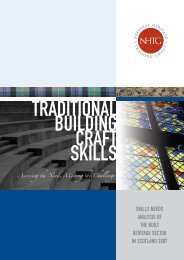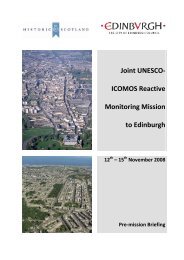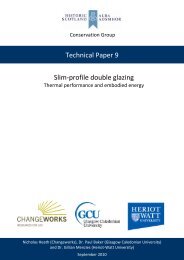NTS Report 4 Aug 2010 - National Trust for Scotland
NTS Report 4 Aug 2010 - National Trust for Scotland
NTS Report 4 Aug 2010 - National Trust for Scotland
You also want an ePaper? Increase the reach of your titles
YUMPU automatically turns print PDFs into web optimized ePapers that Google loves.
17<br />
The Need <strong>for</strong> Vision<br />
<strong>NTS</strong> must embed its core purposes in all its work<br />
what it is actually <strong>for</strong>. There has to be a Mission Statement<br />
round which all stakeholders can rally.<br />
R21: The Review recommends that a working group be<br />
established to produce a draft Mission Statement <strong>for</strong> <strong>Trust</strong>ees in<br />
April 2011 emphasising the core purposes and Principles –<br />
Conservation, Access, Enjoyment and Education.<br />
The Group should be set up by the Transition Committee,<br />
proposed on page 10 of this report, in order to invite submissions<br />
from members, staff, volunteers and external stakeholders at an<br />
early stage. Its mandate should be based on the issues which we<br />
identify in the following sections:<br />
It will be <strong>for</strong> the <strong>Trust</strong>ees to decide how to take <strong>for</strong>ward the<br />
report of the Group. We believe there are good reasons, in the<br />
spirit of engagement advocated in this report, in the Mission<br />
Statement thereafter being debated at the September 2011<br />
AGM .<br />
Not in a Vacuum<br />
The Review has considered how the purposes and Principles can<br />
be rooted in the daily work and <strong>for</strong>ward planning of the <strong>National</strong><br />
<strong>Trust</strong> <strong>for</strong> <strong>Scotland</strong>. It makes the following proposals:<br />
The Purposes and the Principles<br />
The <strong>National</strong> <strong>Trust</strong> <strong>for</strong> <strong>Scotland</strong> Order Confirmation Acts of<br />
1935 and 1938 state that the charity’s core purposes are<br />
Conservation, Access and Enjoyment.<br />
The legislation does not prioritise any of these purposes, leaving<br />
the <strong>Trust</strong> free to interpret and manage them in a generally coordinated<br />
way. We recognise that the language used 80 years<br />
ago in the Acts may require updating, although the terms used<br />
cannot be altered until a new Bill is introduced at a later stage in<br />
the Scottish Parliament.<br />
The Principles, written between 1999 and 2004, state how <strong>NTS</strong><br />
purposes should apply in the 21st century.<br />
The <strong>Trust</strong> should consider merging the Conservation, Access,<br />
Enjoyment and Education Principles into a single document.<br />
In the meantime, it is essential that these are understood and<br />
‘lived’ by <strong>Trust</strong>ees, staff and volunteers.<br />
We make the following proposals:<br />
<strong>Trust</strong>ee Commitment<br />
P2: The Review proposes that <strong>Trust</strong>ees should commit to putting<br />
Conservation, Access, Enjoyment and Education at the centre of<br />
their work.<br />
We believe that an early statement to this effect by the new<br />
<strong>Trust</strong>ees will give direction to the charity and will provide<br />
reassurance to the many members who have expressed fears that<br />
it has lost its way in recent years.<br />
Induction and Training<br />
P3: The Review proposes that all <strong>Trust</strong>ees and directors should<br />
have <strong>for</strong>mal training in all of the <strong>Trust</strong>’s Principles.<br />
P4: The Review proposes that all of the <strong>Trust</strong>’s Principles<br />
should be a mandatory part of all staff induction procedures.<br />
Internal conflicts can often be traced back to a lack of adequate<br />
training. Staff and <strong>Trust</strong>ees should receive training in all of the<br />
<strong>NTS</strong> Principles.<br />
The Strategic Plan<br />
P5: The Review proposes that the Principles should underpin<br />
both the Strategic and corporate plans, and should be cited in<br />
both documents.<br />
A Triple Bottom Line<br />
P6: The Review proposes that Conservation should <strong>for</strong>m part of<br />
a triple bottom line in all <strong>NTS</strong> decision-making, alongside<br />
Finance and People.<br />
No decisions should be reached at any level of the <strong>Trust</strong> without<br />
participants being required to certify that they have considered<br />
their impact upon conservation, the budget and people.<br />
This proposal is consistent with other recommendations made in<br />
this report about the need <strong>for</strong> balanced decision-making.<br />
Education<br />
<strong>NTS</strong> arranges over 100,000 individual visits by schoolchildren<br />
to <strong>Trust</strong> properties each year. In addition, it organises a series of<br />
events and activities to engage people of all ages in its<br />
conservation work.<br />
These are excellent means of delivering <strong>NTS</strong> core purposes –<br />
particularly access and enjoyment – to the next generation and of<br />
building up future support.<br />
Advocacy<br />
A Future <strong>for</strong> Our<br />
Past: some of<br />
the 100,000<br />
schoolchildren<br />
who enjoy <strong>NTS</strong><br />
properties every<br />
year – learning<br />
what has been<br />
handed down to<br />
their generation<br />
and what they<br />
will pass on one<br />
day.<br />
<strong>NTS</strong> has a wider role than simply owning and preserving<br />
properties. It was established ‘<strong>for</strong> <strong>Scotland</strong>’ and, in this<br />
capacity, should be working through advocacy, influence and<br />
persuasion to ensure effective conservation throughout the<br />
country.<br />
Financial difficulties have limited what the <strong>Trust</strong> has been able<br />
to do in this area in recent years. The new Board should,<br />
however, aim to help the charity again find its voice as an<br />
independent advocate <strong>for</strong> natural and cultural conservation.<br />
With expert staff and advisers, it is well placed to advance<br />
debate and policy development.<br />
In the section of this report headed ‘For the Benefit of the<br />
Nation’ (pp36 to 37) we explore ways in which <strong>NTS</strong> can engage<br />
more fully in such work in partnership with other heritage<br />
organisations and elected representatives.



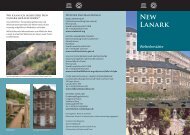
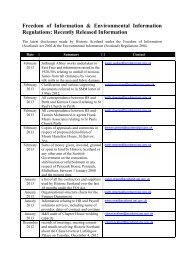
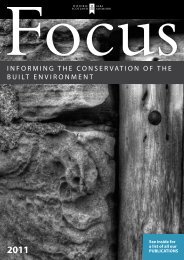
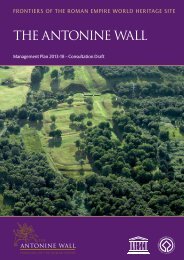
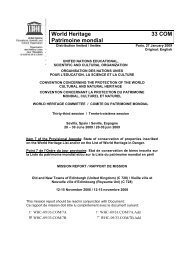
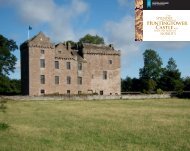
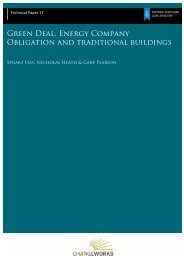
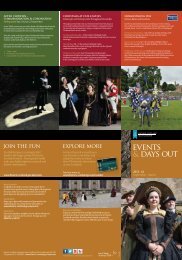
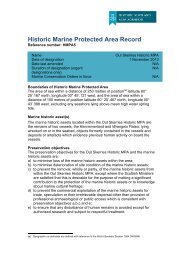
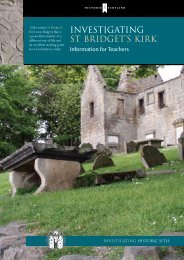
![Elgin Cathedral Wedding Brochure [pdf, 544kb] - Historic Scotland](https://img.yumpu.com/22301571/1/190x151/elgin-cathedral-wedding-brochure-pdf-544kb-historic-scotland.jpg?quality=85)

